Celebrating our Volunteers
On Tuesday 2nd December 2014, as part of the #GivingTuesday enterprise, we celebrated some of our disabled volunteers by posting on Facebook about their amazing gifts and contributions to Through the Roof. Those posts are collected here...
As Chair of Through the Roof, Mike, with guide dog Oxford at his side, provides leadership to the whole charity, and is a regular guest speaker in churches across the UK and the world. Thank you Mike for your unique contribution… It’s good to give!
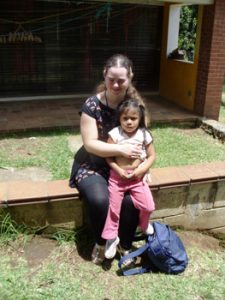 Philippa travelled on mission to Guatemala, and has worked for Through the Roof as a Youth Ambassador, using her experience of being blind from birth to inspire thousands of people with the Bible message of inclusion and God’s heart for disabled people. Thank you Philippa for your unique contribution… It’s good to give.
Philippa travelled on mission to Guatemala, and has worked for Through the Roof as a Youth Ambassador, using her experience of being blind from birth to inspire thousands of people with the Bible message of inclusion and God’s heart for disabled people. Thank you Philippa for your unique contribution… It’s good to give.
 Brian contributes his business acumen to assist Through the Roof with our finances each week, his electric wheelchair enabling him to get round the office quickly. Thank you Brian for your unique contribution… It’s good to give!
Brian contributes his business acumen to assist Through the Roof with our finances each week, his electric wheelchair enabling him to get round the office quickly. Thank you Brian for your unique contribution… It’s good to give!
 Jenny has tirelessly provided support and encouragement to disabled people all around the UK for 40 years. An electric wheelchair user, she coordinates Through the Roof’s programme for disabled Christians and was awarded the MBE in 2012. Thank you Jenny for your unique contribution…It’s good to give!
Jenny has tirelessly provided support and encouragement to disabled people all around the UK for 40 years. An electric wheelchair user, she coordinates Through the Roof’s programme for disabled Christians and was awarded the MBE in 2012. Thank you Jenny for your unique contribution…It’s good to give!
 Abigail travelled to India with Through the Roof to encourage and inspire hundreds of schoolchildren, church congregations and Government Officials through sharing her own experience of the positives and challenges of living with autism. Thank you Abigail for your unique contribution… It’s good to give!
Abigail travelled to India with Through the Roof to encourage and inspire hundreds of schoolchildren, church congregations and Government Officials through sharing her own experience of the positives and challenges of living with autism. Thank you Abigail for your unique contribution… It’s good to give!
 Karen channels her energy, enthusiasm and passion into the cause of Through the Roof, regularly pushing through the pain of life with arthritis to organise several fundraising events in her village, encouraging local people to donate thousands of pounds throughout the year. Thank you Karen for your unique contribution… It’s good to give!
Karen channels her energy, enthusiasm and passion into the cause of Through the Roof, regularly pushing through the pain of life with arthritis to organise several fundraising events in her village, encouraging local people to donate thousands of pounds throughout the year. Thank you Karen for your unique contribution… It’s good to give!
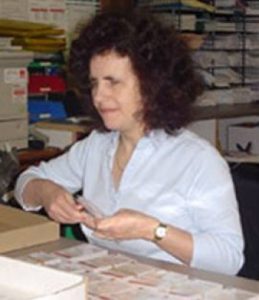 Anita records and copies Through the Roof’s print and audio resources (including the Vital Link, and Coming Fishing) onto CD and cassette to benefit other blind people like her. Thank you Anita for your unique contribution… It’s good to give.
Anita records and copies Through the Roof’s print and audio resources (including the Vital Link, and Coming Fishing) onto CD and cassette to benefit other blind people like her. Thank you Anita for your unique contribution… It’s good to give.
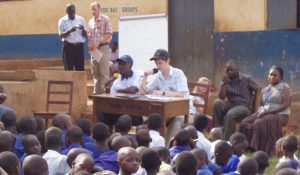 James played a key role in a Through the Roof team visit to Uganda, positively encouraging hundreds of teachers, church and community leaders to focus on ability not disability. With support he wrote down his presentation so that his learning disability and autism didn’t get in the way of his mission. Thank you James for your unique contribution… It’s good to give!
James played a key role in a Through the Roof team visit to Uganda, positively encouraging hundreds of teachers, church and community leaders to focus on ability not disability. With support he wrote down his presentation so that his learning disability and autism didn’t get in the way of his mission. Thank you James for your unique contribution… It’s good to give!
 Paula, who regularly uses a wheelchair, channels her great enthusiasm, energy, humour and love for Jesus into leading adults on spiritual retreats and activities for children and families.
Paula, who regularly uses a wheelchair, channels her great enthusiasm, energy, humour and love for Jesus into leading adults on spiritual retreats and activities for children and families.
Thank you to all of our volunteers and team! Through the Roof's work depends upon all of your contributions.
Celebrate Our Volunteers on #GivingTuesday

We’ll be celebrating the amazing contribution of eight of our disabled volunteers on Giving Tuesday (2nd December) – our volunteers do incredible work, and we wouldn’t be able to function as a charity without them. Please join us on our facebook page for a series of tributes to them and all they give. We’d love to hear your own stories and suggestions too! Please contribute and comment as it’s all going on, and maybe consider if you’d like to join in.
#GivingTuesday – 2nd December, 2014 – aims to provide a charitable antidote to the pre-Christmas consumer boom, falling directly after two of the biggest seasonal shopping days. It launched in the US in 2012 and has since become a global movement with 10,000 partners taking part worldwide last year. For more details about the #GivingTuesday movement, visit givingtuesday.org.uk or follow @givingtuesdayuk on Twitter.
Visit to India (Ros' Blog)
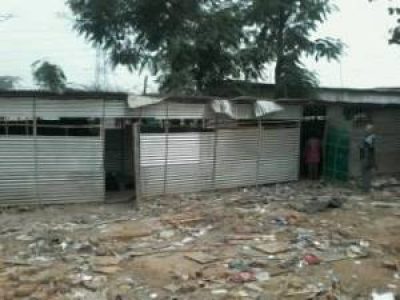
In the midst of a very severe trial, their overflowing joy and their extreme poverty welled up in rich generosity. (2 Corinthians 8.2)
I have just returned from 3 wonderful, eventful weeks in New Delhi. I was staying at a place I have long wanted to visit because it has moved me like no other community outreach; a home for young women (aged eighteen to twenty-two) rescued from traffickers. Their backgrounds are traumatic beyond anything we could imagine, and yet they are also a living testament to the healing power of God.
One evening these young ladies danced for me – they love to dance! They did a slow, very graphic and dark dance about trafficking and followed this with an exuberant dance about breaking the chains, and the freedom they now enjoy. Their faces radiated joy, and it was all the more poignant because on the wall above them was a wall-hanging bearing the words, “You have turned my wailing into dancing, you have removed my sackcloth and clothed me with joy.”
I was asked to share my testimony with them, and an interpreter was brought in to help. The girls’ comments back to me through the interpreter showed that God was really speaking to them through my story of His faithfulness to me. Several of them either spoke to me or wrote to me afterwards to share more about how my words had helped them to see how God can be trusted.
Part of my testimony includes miracles of provision when I had to escape, with my youngest daughter, from marital abuse. Again and again God provided supernaturally – a place to live, money, gifts, even the use of a holiday house for a few days in the summer. When the ladies running the girls’ home heard my story, they asked me to tell it again to a group of women who have fled abusive marriages. These women are Hindus who have had very little exposure to the Good News of Jesus. They sat wide-eyed as I told them the many ways in which God had provided for me, and it was a tremendous privilege to be able to tell them that if they would put their faith in Jesus, He would provide for them.
As well as these two homes and the project with abused wives, the church I was visiting also runs two children’s homes, one for girls and one for boys all of whom are HIV positive. They have started two schools as well, and the children from the homes attend the schools. One of these schools is in the middle of a slum known as Bengali Basti. The children in this slum live in houses which are typically a few tree branches propped up with leaves draped over them for a covering, or if they are very fortunate, a piece of corrugated tin on top, and with pieces of fabric draped down the sides to form makeshift walls. The school in this slum consists of bamboo poles strung together with corrugated tin on top and around the sides. Pieces of carpet and linoleum line the floor and the children sit cross-legged and write in exercise books on their laps.
The other school is in a four-room apartment on the ground floor of an apartment block. Seventy children cram into these four rooms, children who would otherwise be spending their days darting in and out of the heavy traffic to beg from the drivers and rickshaw passengers. The kitchen, where a daily meal of dhal and rice for all seventy children is prepared, also doubles as the head teacher’s office. None of the teachers has had any formal teacher training, including the two head teachers (the church cannot afford to pay trained teachers) and yet they are preparing the children for India’s exam system, and giving them hope for a good future. When I took a lesson, first in one school and then the other, on creative writing, all the children I taught were able to do a written exercise very competently, and the braver ones wrote it in English. It’s quite remarkable the standards that are being achieved.
I was asked to assess 3 children who seemed to have learning disabilities, and advise on the best way to further their learning. Two of them appeared to have learned nothing at all in the year or two they had been in the school, and the other, although very bright and a quick learner, was clearly quite high on the autism spectrum. I was able to take a practical training session on autism with the teachers, and also a session on how to write Individual Education Plans with realistic, manageable targets, that could be used to further the education of these children with additional needs. I’m planning to go back in a year or so to see what progress they have made.
Unfortunately 8 days of my 3 weeks was spent in bed very ill with dengue fever. Yet even through the illness I was aware of ways that God was at work in me, and I came home changed for having had the experience.
The pastor’s son in this church has Down’s Syndrome and autism, and life is very hard for the pastor and his wife in a system where no disability benefits, no care, no respite and no education exists for children with disabilities (he is 28 and their church schools had not been started when he was a child). In all those years they have never had a break from their son, all day long every single day they are caring for him. But I was challenged and delighted to see how the church has embraced him, in a way that would put many British churches to shame. He is totally accepted and loved as a member of the church family, and even more importantly, his practical talents and spiritual gifts are recognised. He plays the drums in the worship band, usually just following the lead of the other musicians. But one Sunday when I was there he suddenly diverted from what the other musicians were doing and started playing a very different beat, and his father, in his sermon later, had a really powerful explanation of what God was saying to the church through that change of direction in the music. He often prays during the service, and if someone requests prayer he lays hands on them and prays for them. He is given complete freedom to exercise his gifts in this way, just like any other member of the church. Several people described him to me as “another pastor”.
This church also has a number of other community projects providing protection for children and employment for women. I came home really challenged to see how a small community of God’s people, who have so much less than we do, are giving so much more than most of us ever do, and making a difference to their city out of all proportion to the resources available to them.
Our Winter 2014 Vital Link Newsletter
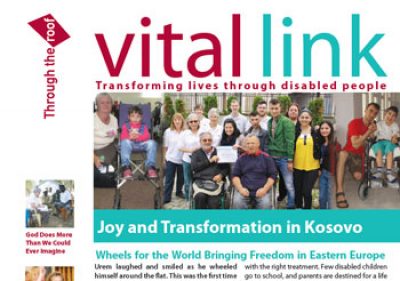
Our Winter 2014 Vital Link is now available for download. It contains a report about our recent distribution in Kosovo, stories from holidays, our recent research findings about disabled people's experience of church, and much more. Please download it and take a look.
Please note - the PDF also contains a donation form.
Follow this link to download the Winter 2014 Vital Link Newsletter as a PDF - Please 'Right-Click' and save the file.
Please get in touch (on 01372 749955 or by following this link to email us) if you have any problems downloading this, or if you’d like to receive future newsletters by post or email.
We've noticed a few problems with images being displayed for Google Chrome users - if you have any problems, please try downloading the file and viewing it in another programme, or use Firefox or IE. We're going to try and make sure there isn't a problem with upcoming issues. Sorry for any inconvenience.
'Love Your Enemies' - Our November 2014 Come Fishing
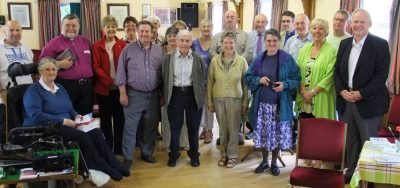
Here's the latest episode of 'Come Fishing', from Jenny Edwards MBE. Each episode contains news, stories, music, and inspiration. We hope you enjoy it!
- Follow this link to download October's Through the Roof Podcast.
- Follow this link to visit our Podcast page on iTunes, and subscribe to receive it as soon as it's released
Ashtead Jazz Cafe
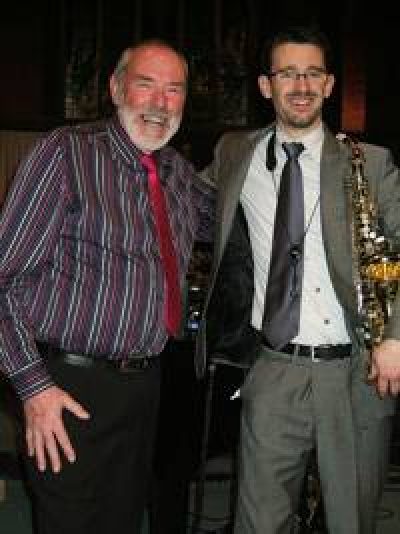
Saturday 13th December sees the return of the 'Jazz Café' to Ashtead, featuring The Tim Boniface Big 6 Swing Band. Starting at 7.30pm, this will be an evening of music at St George’s Christian Centre, with proceeds going towards Wheels for the World. Tickets cost £15 (£8 students), and are available from St George’s Christian Centre, Barnett Wood Lane, Ashtead, KT21 2D (01372 813964) or Alaisdair and Jenny Wallace, (01372 275639).
'Strength in Weakness' - Our October 2014 Come Fishing
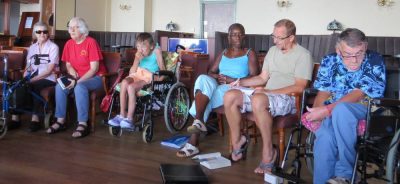
Here's the latest episode of 'Come Fishing', from Jenny Edwards MBE. Each episode contains news, stories, music, and inspiration. We hope you enjoy it!
- Follow this link to download October's Through the Roof Podcast.
- Follow this link to visit our Podcast page on iTunes, and subscribe to receive it as soon as it's released
Parent and Child (Ros' Blog)
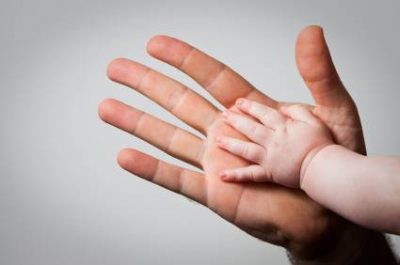
Intellectually, it was an easy decision to move our daughter into a residential care home when she left College at the age of 22. Emotionally, it was a different story altogether! After twenty-two years of lifting and handling her, often with no equipment or support, I simply could not go on undertaking her physical care from day to day. Nor could I take any more sleepless nights. In my twenties I had learned to survive on very little sleep, but by the time I was approaching my fifties, the sleep deprivation was taking more of a toll (she has never slept very much, and that didn’t change as she grew older). So on one level it was an obvious choice, but that didn’t make it an uncomplicated one.
Eighteen months before she was due to leave College, I sat down and gave God a “shopping list” of what I wanted for her. It had to be a small, family-sized home – she wouldn’t cope in a large setup. I wanted her to be with other young people of her own age, who would share her interests and be good company for her. And I wanted it to be in the town where we lived, on our doorstep, not miles away, so that she could remain very much part of our family and our church. I knew I was asking the impossible. No such provision existed.
And then, guess what? God did the impossible. Just as she was leaving College, a care provider bought up a six bedroom house a few roads away from our home and turned it into a residential care home for young people. Ellen was the first to move in, followed over the next couple of years by five other young people, all of them wheelchair users with varying degrees of learning disability. The home is staffed by wonderful carers and an efficient and understanding manager. It takes me five minutes to get there. On Sundays I call on the way to church, collect Ellen, take her to church with me, then back to my house to spend the day with her sisters and me, and then back to her own home at bedtime. It’s easy to pop in during the week for a coffee with her, or to take her out to lunch.
I wasn’t looking forward to relinquishing her care to strangers. But gradually, as she settled in and I learned to relax more and accept the situation, I made a wonderful discovery. I began to be aware that I was gradually changing roles. Over the years I had unwittingly slipped more and more into the role of carer, and felt less and less like a mum. Now that process began to reverse. I stopped relating to her as a carer and felt like a real, proper mum again. When I interact with her now, it’s not usually because she has a need, but because we want to go and have some fun together. Of course there are still some things like hospital appointments which don’t fall into the category of fun, but most of my contact with her is to have her home with the family, do some girly shopping or go out to lunch. Even the boring bits can be combined with fun – tomorrow I’m taking her for a flu jab via McDonalds!
My relationship with each of my three girls is quite unique, because they are such very different characters. But I can say unhesitatingly that Ellen’s disability hasn’t made her any less close to me than her sisters. In fact we have a really distinctive relationship, as she looks to me to do things for her that she can’t do for herself, from the small things like blowing her nose to the much bigger things like buying a wheelchair adapted car.
And that got me thinking. If Ellen’s disability forms a unique and important part of my relationship with her, and is one of the things that has drawn us close as parent and child, wouldn’t God as a Father see it in the same way too? Having a disability doesn’t make you one of God’s lesser children – less important or less valued. Rather, the need to depend more on Him can be the very thing that deepens your relationship with Him, and you can be sure He holds you very close to His heart as one of His loved and treasured children. Nor is His relationship with you based on your need or your dependency, but as with Ellen and me, there’s a large place in the relationship for reciprocal affection and downright fun.
Paul wrote, “All who follow the leading of God’s Spirit are God’s own sons. Nor are you meant to relapse into the old slavish attitude of fear—you have been adopted into the very family circle of God and you can say with a full heart, “Father, my Father”. The Spirit himself endorses our inward conviction that we really are the children of God. Think what that means. If we are His children we share His treasures, and all that Christ claims as His will belong to all of us as well! Yes, if we share in His suffering we shall certainly share in His glory.” (Romans 8. 14-17, J.B. Phillips Translation)
My prayer for you is that you will know that you have the right to cry, “Father, my Father”, and that you will have the assurance of the Holy Spirit that you are part of God’s family circle, heir to all His treasures, and uniquely positioned to share in His glory as you now share in the sufferings of Christ.
October 2014 Podcast
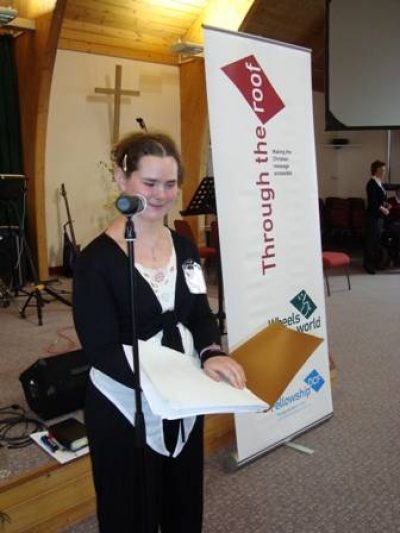
The Through the Roof Podcast returns for October. Philippa is back with the latest, and last, in our series of podcasts. Find out the latest news and stories from Through the Roof, and stay in touch by following us at www.throughtheroof.org, TTR's Facebook Page", and TTR's Twitter Feed.
Music is used with the kind permission of Andre Luis and comes from Andrelouis.com
- Follow this link to download October's Through the Roof Podcast.
- Follow this link to visit our Podcast page on iTunes, and subscribe to receive it as soon as it's released
Enabling Church Training Course
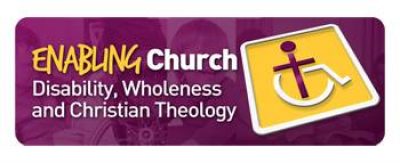
Following on from the successful Enabling Church conference in the Diocese of Lichfield in June, Through the Roof, partners of the Churches for All network, and the Diocese are delivering fresh new content as part of a new training course suitable for anyone keen to explore the topic further. The course will take place over October and November 2014, every other Tuesday from 10am to 4pm at St. Thomas' in Aldridge. Please follow this link to download a PDF flyer with more details, and to book your place.


